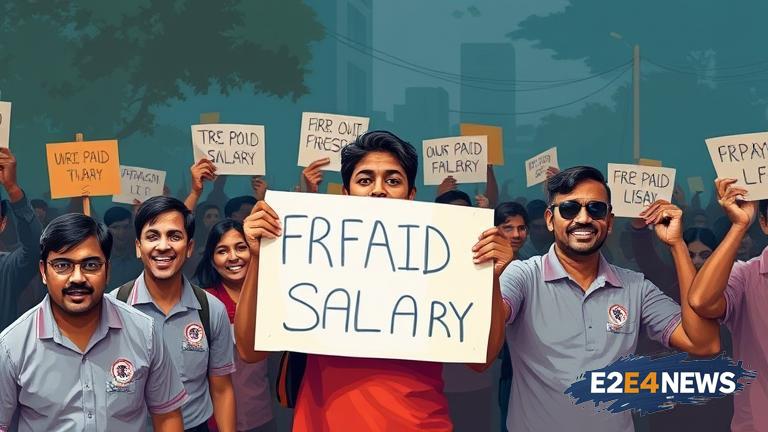A shocking incident has come to light in Pune, where a Tata Consultancy Services (TCS) employee was forced to sleep outside the company’s office due to non-payment of salary. The employee’s plight was highlighted after a photo of him sleeping outside the office went viral on social media, sparking widespread outrage and criticism. The incident has raised questions about the company’s treatment of its employees and its handling of salary payments. According to reports, the employee had not received his salary for several months, despite repeated requests to the company. The employee’s decision to sleep outside the office was seen as a desperate attempt to draw attention to his plight. The photo of the employee sleeping outside the office was widely shared on social media, with many users expressing shock and outrage at the company’s alleged mistreatment of its employee. TCS has since responded to the incident, citing that the employee had been absent from work without authorization. The company claimed that the employee had not followed the proper procedures for reporting his absence, which had resulted in his salary being withheld. However, the employee’s supporters have disputed this claim, arguing that the company’s actions were unfair and unjustified. The incident has sparked a wider debate about the rights of employees and the responsibilities of companies towards their staff. Many have called for greater protections for employees and more stringent regulations to prevent such incidents from occurring in the future. The incident has also highlighted the need for greater transparency and accountability in the way companies handle salary payments and employee grievances. TCS has faced criticism in the past for its treatment of employees, with some accusing the company of exploiting its staff and prioritizing profits over people. The company has denied these allegations, arguing that it values its employees and is committed to their well-being. However, the latest incident has raised fresh concerns about the company’s commitment to its employees and its handling of sensitive issues. The Indian government has also faced criticism for its handling of labor laws and employee protections, with some arguing that the current framework is inadequate and fails to provide sufficient safeguards for workers. The incident has sparked calls for reform and greater investment in labor protections, with many arguing that the government needs to do more to support workers and prevent exploitation. The TCS employee’s viral protest has also highlighted the power of social media in bringing attention to social and economic issues. The incident has shown how a single photo can spark widespread outrage and mobilize public opinion, highlighting the need for companies to be more responsive to their employees and more transparent in their dealings. As the incident continues to unfold, it remains to be seen how TCS will respond to the criticism and what steps the company will take to address the concerns of its employees. The incident has also raised questions about the role of trade unions and employee organizations in protecting workers’ rights and preventing exploitation. The TCS employee’s protest has sparked a wider debate about the need for greater collective action and solidarity among workers, with many arguing that employees need to be more organized and vocal in defending their rights. The incident has also highlighted the need for greater awareness and education about labor laws and employee protections, with many arguing that workers need to be more informed about their rights and how to assert them. In conclusion, the TCS employee’s viral protest has sparked a major controversy and highlighted the need for greater protections for employees and more stringent regulations to prevent exploitation. The incident has raised important questions about the responsibilities of companies towards their staff and the need for greater transparency and accountability in the way companies handle salary payments and employee grievances.





